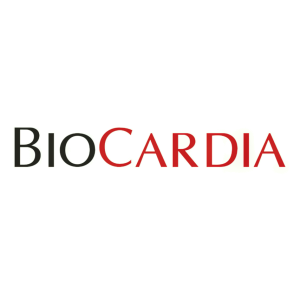BioCardia Announces CMS Approval of Coverage for CardiAMP Cell Therapy Confirmatory Phase III Heart Failure Study
SUNNYVALE, Calif., March 12, 2024 (GLOBE NEWSWIRE) -- BioCardia, Inc. [Nasdaq: BCDA], a developer of cellular and cell-derived therapeutics for the treatment of cardiovascular and pulmonary diseases, today announced Centers for Medicare & Medicaid Services (CMS) approval for reimbursement coverage of the confirmatory Phase III clinical trial of CardiAMP autologous cell therapy for the treatment of patients with ischemic heart failure.
CMS has reviewed the CardiAMP Heart Failure II Trial and approved the investigational product, related and routine items and services for purposes of Medicare coverage. CMS previously published a New Technology APC (Ambulatory Payment Classifications) code that covers the CardiAMP Cell Therapy investigational study procedure, including the BioCardia investigational products utilized to perform the study procedure, allowing the study centers to be reimbursed for the study procedure and products.
The CardiAMP Heart Failure II Trial is FDA approved to enroll up to 250 patients at up to 40 clinical centers. The study includes an eligibility requirement that patients demonstrate a pre-specified NT-proBNP level at baseline. The primary endpoint is a hierarchical composite assessment consisting of all-cause death, the cardiac death equivalents of heart transplant and left ventricular assist device (LVAD) implantation, heart failure hospitalizations, worsening heart failure events treated as an outpatient, and change in quality-of-life, with a follow-up duration ranging from a minimum of 12 to a maximum of 24 months.
The CMS coverage approval is supported by the scientific rigor of the protocol design and the results from the interim data from the CardiAMP Heart Failure Trial recently presented at the Technology and Heart Failure Therapeutics 2024 annual meeting. Across all patients there was a reduction in cardiac death equivalents and major adverse cardiac and cerebrovascular events. In the subgroup of patients targeted in the CardiAMP Heart Failure II Trial, results showed large absolute and relative risk reduction of heart death equivalents of the patients in the treated group. Treated patients also had reduced major adverse cardiac events and greatly improved quality of life.
“We are pleased that CMS has provided coverage support for the confirmatory CardiAMP Heart Failure II study.” said Peter Altman, PhD., BioCardia’s President and Chief Executive Officer. “To my knowledge, no therapy has been proven to reduce mortality in these patients, and CardiAMP Heart Failure II has great potential to achieve this outcome by confirming our CardiAMP Heart Failure Trial results.”
About the CardiAMP Cell Therapy Program
Designated by the FDA as a Breakthrough Therapy, CardiAMP Cell Therapy uses a patient’s own bone marrow cells delivered to the heart in a minimally invasive, catheter-based procedure to potentially stimulate the body’s natural healing response. CardiAMP Cell Therapy incorporates three proprietary elements not previously utilized in investigational cardiac cell therapy: a pre-procedural cell analysis for patient selection, a high target dosage of cells, and a proprietary delivery system that has been shown to be safer than other intramyocardial delivery systems and exponentially more successful in cell retention. The CardiAMP clinical development for heart failure is supported by the Maryland Stem Cell Research Fund and is reimbursed by CMS for both treatment and control procedures.
CAUTION - Limited by United States law to investigational use.
About BioCardia®
BioCardia, Inc., headquartered in Sunnyvale, California, is developing cellular and cell-derived therapeutics for the treatment of cardiovascular and pulmonary disease. CardiAMP autologous and CardiALLO allogeneic cell therapies are the Company’s biotherapeutic platforms for the treatment of heart disease. BioCardia also works with partners to provide its proprietary biotherapeutic delivery system along with preclinical and clinical development services for biotherapeutic delivery to the heart.
Forward Looking Statements:
This press release contains forward-looking statements that are subject to many risks and uncertainties. Forward-looking statements include, among other things, statements relating to completing follow-up in the CardiAMP Heart Failure Trial, the probability of success of the CardiAMP clinical trials, ability to offset clinical costs utilizing Medicare reimbursement, anticipated milestones and events, and the ultimate success of our clinical cell therapy programs. These forward-looking statements are made as of the date of this press release.
We may use terms such as “believes,” “estimates,” “anticipates,” “expects,” “plans,” “intends,” “may,” “could,” “might,” “will,” “should,” “approximately” or other words that convey the uncertainty of future events or outcomes to identify these forward-looking statements. Although we believe that we have a reasonable basis for each forward-looking statement contained herein, we caution you that forward-looking statements are not guarantees of future performance and that our actual results may differ materially from the forward-looking statements contained in this press release. Factors that could cause or contribute to such differences include, but are not limited to, the Company’s liquidity position and its ability to raise additional funds, as well as the Company’s ability to successfully advance its clinical trials. As a result of these factors, we cannot assure you that the forward-looking statements in this press release will prove to be accurate. Additional factors that could materially affect actual results can be found in BioCardia’s Form 10-K filed with the Securities and Exchange Commission on March 29, 2023, under the caption titled “Risk Factors” and in its subsequently filed Quarterly Reports on Form 10-Q. BioCardia expressly disclaims any intent or obligation to update these forward-looking statements, except as required by law.
Media Contact:
Miranda Peto, Marketing / Investor Relations
Email: mpeto@BioCardia.com
Phone: 650-226-0120
Investor Contact:
David McClung, Chief Financial Officer
Email: investors@BioCardia.com
Phone: 650-226-0120









